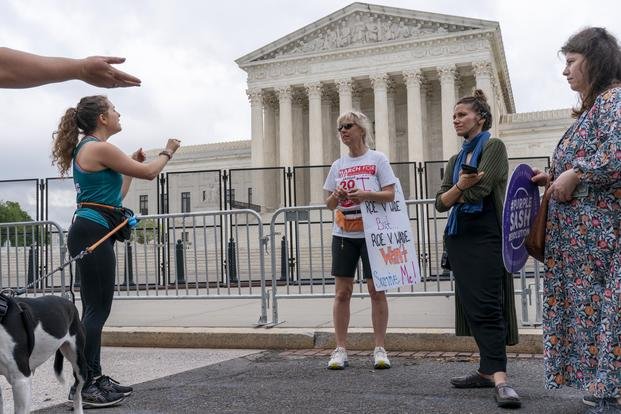

House Democrats are moving to ensure service members can take leave to get an abortion ahead of the Supreme Court’s expected ruling to overturn the landmark Roe v. Wade decision that prevents states from outlawing the procedure.
A draft of the fiscal 2023 defense spending bill released Tuesday by House Appropriations Committee Democrats would not allow the Pentagon “to deny leave for any member of the Armed Forces or civilian employee of the Department of Defense … who is pregnant and requests leave to obtain an abortion” or “is the spouse, partner, or significant other of a pregnant individual and requests leave to assist that individual in obtaining an abortion,” according to the bill text.
The House Appropriations Committee’s defense subcommittee is scheduled to meet behind closed doors Wednesday to advance the spending bill.
Read Next: Navy Secretary Censures 5 Officers over Fatal AAV Sinking
While the provision has a long way before it becomes law and is expected to face efforts by Republicans throughout the lawmaking process to remove it from the bill, the inclusion signals Democrats’ willingness to put up a fight over abortion rights in the military.
The spending bill also appears to be an opening salvo from Democrats in using the annual defense bills as a battleground over abortion rights, with lawmakers suggesting the separate defense policy bill soon to be debated by the Senate and House Armed Services Committees could also tackle the issue.
“Service members have the right to control their own bodies no matter where they are stationed,” Sen. Mazie Hirono, D-Hawaii, said at a Senate Armed Services Committee personnel subcommittee meeting Tuesday to consider an initial draft of the defense policy bill. “It is this committee’s responsibility to protect that right.”
The personnel subcommittee did not include anything in its portion of the National Defense Authorization Act, or NDAA, related to abortion. But four members of the Senate Armed Services Committee, including Hirono, have introduced a bill that would allow the military to pay for and conduct abortions. The full committee is scheduled to begin debating and offering amendments to the NDAA on Wednesday.
Right now, federal law prohibits Tricare, the military’s health insurance, from covering abortions and military treatment centers from providing abortions unless the mother’s life is in danger or the pregnancy was the result of rape or incest.
That means service members have to go off base to terminate a pregnancy — something that Democrats and abortion rights advocates have been arguing makes female service members particularly vulnerable to Roe’s expected overturning since they cannot choose where they are stationed.
Last month, a draft Supreme Court opinion leaked and published by Politico revealed the court’s conservative majority is poised to overturn Roe, the landmark 1973 ruling that guaranteed the right to an abortion nationwide.
Up to 26 states could ban abortion after Roe is overturned, including 13 that have so-called trigger laws to immediately end abortion after a Supreme Court ruling, according to the pro-abortion rights Guttmacher Institute.
Many of the biggest military bases in the country are in those states, such as Fort Hood in Texas.
Previous efforts in Congress to expand abortion access and other reproductive care for service members have made it into early NDAA drafts, only to be taken out in the final version that became law because of strong Republican opposition — potentially foreshadowing how the fight will go this year.
For example, in 2010, a Senate version of the NDAA would have removed the restriction on performing abortions in Defense Department facilities, but that provision was stripped from the bill before it became law.
In addition to Tuesday’s move in the fiscal 2023 defense spending bill and Senate Armed Services Committee members telegraphing a fight in their NDAA, a key House lawmaker recently suggested the House’s version of the NDAA could also see a debate over abortion rights.
“I want to make sure that our service members are going to be ready to do what they’re trained to do, and if readiness is impacted by the fact that women are going to have to travel thousands of miles when they are in need of abortion services, then we need to look at that,” Rep. Jackie Speier, D-Calif., told reporters last week when asked if she expected the committee to debate abortion rights when it considers its NDAA.
Speier, the chair of the House Armed Services Committee’s personnel subcommittee, has introduced a House version of the bill to allow the Defense Department to pay for and provide abortions.
The House Armed Services Committee is scheduled to debate its version of the NDAA next week.
Amid the congressional debate, the Army is weighing a policy that would specify that soldiers can request to move if they feel state or local laws discriminate against them based on gender, sex, religion, race or pregnancy, Military.com reported last month. Sergeant Major of the Army Michael Grinston, the service’s top enlisted leader, also told House lawmakers last month that the force is considering some response if Roe is overturned, though it’s unclear whether that is separate from the draft compassionate reassignment policy.
— Rebecca Kheel can be reached at [email protected]. Follow her on Twitter @reporterkheel.
Related: Military Could Expand Abortion Services Under New Bill Floated by Democrats
© Copyright 2022 Military.com. All rights reserved. This material may not be published, broadcast, rewritten or redistributed.
